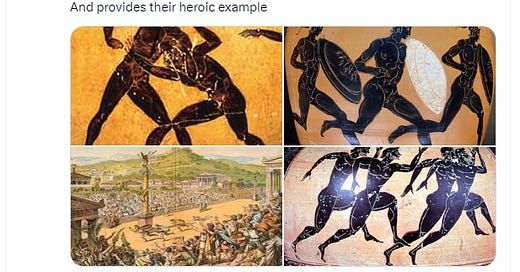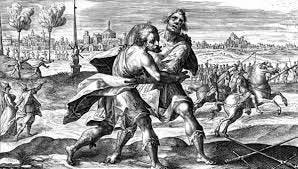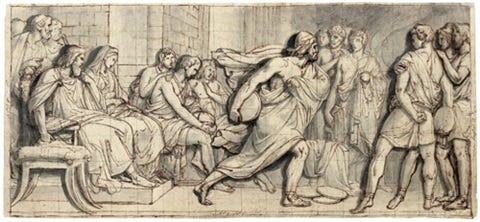Competition is in your bones
The idea of virtue and excellence defines the ancient Greek love of sport. It provides the moral justification for elevating athletics to the height of culture and religious observance.
But virtue cannot just be cultivated in an individual for private display. It must be publicly performed. This is why AGON is necessary.
The Need to Compete
Agon means contest, or the competitive spirit. The Ancient Greeks loved competition and competed in EVERYTHING!
“If you are better than those whom you encounter, do not cease trying to excel everyone else too" These famous words from the philosopher Demosthenes captures it perfectly.
In athletics, competition is the crucible to display and test the character developed through training and discipline. Agon is where you PROVE your Arête.
Odysseus’ and Competition
Let’s return to our friend Odysseus. Remember from post #4 in this series, he was invited to partake in athletic contests as a guest of the Phacians but refused initially. Then after a stinging rebuke he declares that he will in fact compete. If you missed it you can read it HERE
In the Iliad, Odysseus competes as an athlete in Achilles funeral games. He’s known as ‘crafty’ Odysseus and uses his wits and strong frame to wrestle.
He has NOTHING to prove about being an athlete to the Phacians.
Yet without the ability to compete he cannot prove to himself that he still posses the same Arête year. He must show in public that his character remains in tact.
After being rebuked and scorned as a non-athlete Odysseus picks up a discus, twice as heavy as the ones the Phacians have thrown, and he hurls it twice as far. A clear indication of his athletic superiority.
But just as Demosthenes argued, it’s not enough to win once, you must continue to try and win victories and test yourself through consistent competition.
Odysseus turns to his hosts and challenges them all
“Now then, young sports, match this throw, and as soon as you do, I’ll throw another even longer. For the rest, let anyone whose spirit or temper prompts him step out and take me on in boxing or wrestling or footracing or whatever. You have worked me up to such a pitch that I shall not flinch from anything, nor refuse a bout to any single Phaeacian, except my host Laodamas.”
Wisely Odysseus refuses to challenge the King, that’s bad politics, but every other able bodied male he won’t refuse.
The response from the Phacians tells us everything about the importance of Agon.
The King rose and responded “Sir, what you have said is not unwelcome, for it is natural that you should want to show your arete, since you were angered by that man standing up in the gathering and sneering at you as if at your arete, although no man in his right sense would do so.”
A man of character would act exactly as Odysseus did.
He would embrace the competition as a chance to prove himself.
TAKEAWAY
The Greeks valued competition because it wiped the slate clean. A loser had a chance at redemption. The winner must forget the last contest and earn their glory again.
This is the SAME as your moral character and making the right choice.
It’s not enough to make the right choice one time. You must make it consistently. You need to pattern your behaviour to ensure you create a habit of moral virtue.
Each obstacle on our road to self improvement is a mini contest.
We engage in competition with our moral selves.
Will you make the difficult but correct choice?
Use this frame the next time some unforeseen circumstance.
Catch Up on the WHOLE Series
In the next post in this series I’ll dive deeper into the value of competition in breeding moral quality.
Until then catch up on each post in the Living Ancient Athletic Values Series
Post #1: Living Ancient Greek Values Today
Post #2: Forget Reputation: Aim for Virtue






